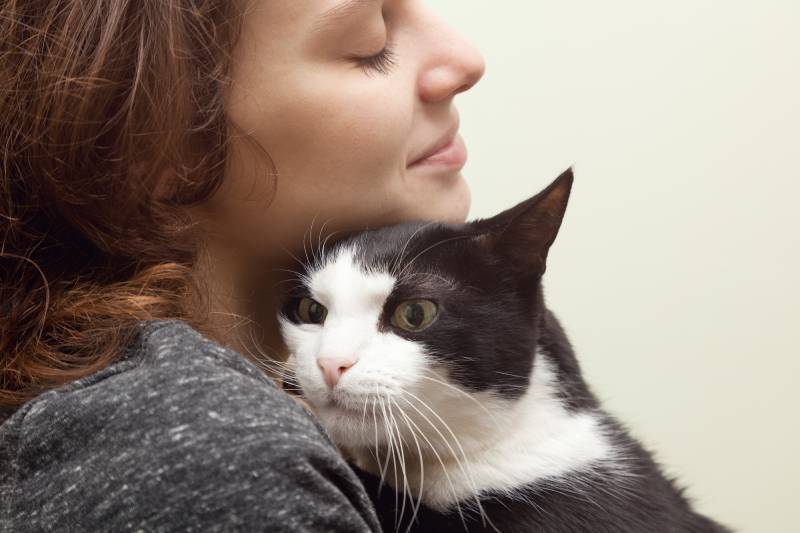
When we think about service animals trained to warn their owners of an oncoming seizure, dogs are typically the first to spring to mind. However, it has been reported by some cat owners who experience seizures that their feline friends can detect seizures—though, as far as we know, there is no scientific evidence to confirm whether or not this is true or not.
Let’s take a closer look at the evidence below.
Three Stories from Cat Parents
Let’s explore what cat parents from around the world have to say about their seizure-detecting kitties and how they react when a seizure is about to happen.

1. Bournemouth, England
In 2011, the BBC reported a story about a young man with epilepsy,1 Nathan Cooper, who shared that his cat, a calico named Lilly, is able to detect his oncoming seizures. Mr. Cooper explained that Lilly alerts his mother before the seizure happens and has displayed behaviors like licking his mouth while he was struggling to breathe during an epileptic fit.
Mr. Cooper’s mother, Tracey, said that Lilly’s alerts mean that they can make the environment safer for Nathan, like moving furniture to prevent injuries, before the seizure started—a fact that has made a big difference in their lives. Lilly went on to win a competition, “My Pet Superstar”, beating 6,000 other pets.
2. Eastbourne, England
A 2018 report by Sussex World revealed that an Eastbourne woman,2 Lucrezia Civita, had detailed how her black cat, Lucky, takes care of her before and during epileptic seizures. Lucrezia said that Lucky leads her to bed when she senses a seizure is about to happen, then remains by her side while the seizure occurs.
Lucrezia also described how Lucky runs around when she senses a seizure, which helps her to plan her day and know when she needs to be more careful and seems to “keep an eye” on her at all times.

3. Albuquerque, New Mexico
A Vet Street article from 2011 tells the story of an Albuquerque radio producer named Katie Stone who explained how the cat (Kitty) she adopted for her daughter,3 Emma, started to let the family know when Emma was experiencing a seizure.
While it was not mentioned whether Kitty reacts prior to the seizure, Stone described how, during one of Emma’s seizures, Kitty stood on top of her and began to yowl and cry. She also talked about the strong bond that Emma has was Kitty, who always sleeps at her side and lets everyone know by meowing outside the bedroom door if she can’t get inside.
Can Cats Be Service Animals?
Service animals are animals trained to support people with medical conditions, including people who experience seizures. According to the Americans with Disabilities Act, only dogs and, in some cases, miniature horses, can be classified as service animals. However, cats can certainly be emotional support animals and therapy pets.
Emotional support animals are permitted to fly with you for free and to live with you even if there is a no-pets policy in place. Your cat can become your official emotional support animal if a therapist has written a letter explaining that this is necessary for your emotional and mental well-being.
Moreover, the fact that the ADA doesn’t recognize cats as service animals doesn’t take away from the fact that cats are capable of supporting and helping their owners in a variety of ways.
Conclusion
In short, though there is no scientific evidence to support the idea that cats can detect seizures, there is some anecdotal evidence around. People who experience seizures have spoken out and detailed their cats’ amazing abilities to detect them before they happen and support and comfort the owner for the duration of the seizure.
It’s unclear how cats can do this due to the lack of scientific research, but one thing that is certain is that cats are very intuitive animals—more than we sometimes give them credit for—and can detect chemical changes that occur in our bodies when something isn’t quite right. This may be linked to how some cats can detect and respond to seizures in humans.
Featured Image Credit: Andriy Blokhin, Shutterstock






